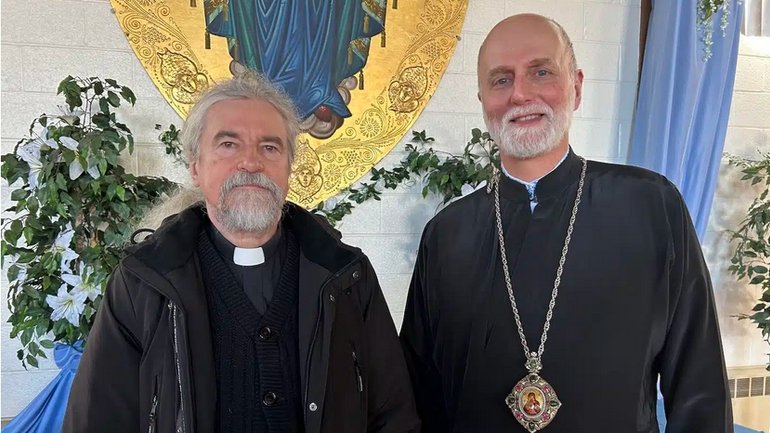There is an ‘evil power’ in Russia, archbishop says

“This is not about politics, but survival,” said retired Archbishop Ihor Isichenko of the Ukrainian Catholic Exarchate of Kharkiv and the Archeparchy of Kyiv.
The archbishop shared his thoughts while recently visiting the Ukrainian Catholic Archeparchy of Philadelphia ahead of the second anniversary of Russia’s full-scale invasion of Ukraine.
Launched on Feb. 24, 2022, the invasion continues attacks initiated in 2014 with the annexation of Crimea and the backing of military separatists in Ukraine’s Luhansk and Donetsk provinces. Two joint reports from the New Lines Institute and the Raoul Wallenberg Center for Human Rights have determined Russia’s invasion constitutes genocide, with Ukraine reporting more than 125,834 war crimes committed by Russia to date in Ukraine since February 2022.
In March 2023, the International Criminal Court issued arrest warrants for Russian President Vladimir Putin and his commissioner for children’s rights, Maria Lvova-Belova, for the unlawful deportation and transfer of at least 19,546 children from occupied areas of Ukraine to the Russian Federation.
The evil power in Russia
Archbishop Isichenko said Russia’s brutal onslaught against Ukraine should “remove the veil from the eyes of the West to see the real Russia.”
Behind Russian cultural and artistic expression, historically admired in the West, lies a “strong, dangerous, evil power,” the archbishop warned.
“We also were under this illusion of the great Russian culture,” admitted Archbishop Isichenko.
The observation is one he is uniquely qualified to make. Born in 1956 in Russia’s Republic of Bashkortostan, traditionally known as Bashkiria, he grew up in the Kharkiv region of Ukraine and forged an academic career in Ukrainian philology and historical literary development. He earned a doctorate from the Taras Shevchenko Institute of Literature in Kyiv, which is named for Ukraine’s premier poet.
He later entered Patriarch Mstyslav College in Kharkiv, and in 1993 was ordained a priest of the Ukrainian Autocephalous Orthodox Church, or UAOC, which along with the Ukrainian Orthodox Church of the Kyiv Patriarchate began seeking to distance Ukrainian Orthodoxy from Moscow in the early years of Ukraine’s independence (which the country gained from the former Soviet Union in a 1991 referendum). He was quickly elevated to bishop and then in 1997 to archbishop, becoming a leader among Ukrainian Orthodox faithful as well as an authority on the history of both Christianity and literature in Ukraine.
But in 2015, Archbishop Isichenko began discerning the possibility of bringing his flock into full communion with the Ukrainian Greek Catholic Church, or UGCC. In 2022, that nearly seven-year process became finalized, with three parishes from the UAOC’s Kharkiv-Poltava diocese joining the UGCC’s Exarchate of Kharkiv and the Archeparchy of Kyiv. (The remaining parishes, which for a number of reasons balked at the union, became part of the Orthodox Church of Ukraine.) As an emeritus, Archbishop Isichenko now heads a branch of Ukrainian Catholic University.
‘Nobody expected the conflict’
Kharkiv before the full-scale invasion “was mostly a Russian-speaking city,” Archbishop Isichenko told OSV News. “During my time as a student, there were maybe one or two trains to Kyiv, but maybe more than 10 that went to Moscow. … Almost every family has relatives in Russia. And almost nobody expected conflict. … It was a civilizational shock.”
“And when this war started, the Ukrainian heart started to beat really strongly,” said Archbishop Isichenko.
As part of their attacks on Ukrainian civilians, invading forces have directly targeted Ukraine’s culture, he said.
“In the occupied (areas), Ukrainian books are burned, and people who speak Ukrainian … can be arrested,” he said.
Clergy risking their lives
Days after the archbishop spoke with OSV News, Father Stepan Podolchak, a 59-year-old priest of the Orthodox Church of Ukraine, was dragged barefoot from his home in the Kherson region by Russian forces, who placed a bag over his head and reportedly tortured him to death for refusing to join his church with the Moscow Patriarchate. His body was identified Feb. 15.
Priests in both the Orthodox and Catholic confessions are risking their lives to minister to the faithful, said Archbishop Isichenko.
Some clergy who initially fled the shelling have returned to the Kharkiv region, especially since “the war (has) increased the intensity of liturgical life,” he said. “Even during the shelling, the services were held while people were gathering in the church, praying … to be close to God during the danger.”
Archbishop Isichenko said Russia’s aggression against Ukraine echoes the Soviet Union’s mass extermination of Ukrainians in the Holodomor, the 1932-1933 artificial famine engineered by Stalin that killed at least four million and possibly as many as 10 million Ukrainians.
“My grandparents and great-grandparents lived through that famine,” he said. “So while I was growing up in a family which was loyal to the (then-Soviet Ukraine) government, I knew since childhood that they wanted … to destroy Ukrainians during the famine.”
Today, “the situation is repeating itself” with a vengeance, said the archbishop. “I can see now that it’s bloodier than that war was. The Russians now behave more brutally during this war than Germans did during World War II.”
Ukrainian soldiers “understand that they protect not only themselves and their existence, but Western civilization and its way of life,” said Archbishop Isichenko. “The example of Ukraine shows you have to have the strength to protect yourself against evil.”
“I hope that the United States doesn’t forget about its values,” he added.









